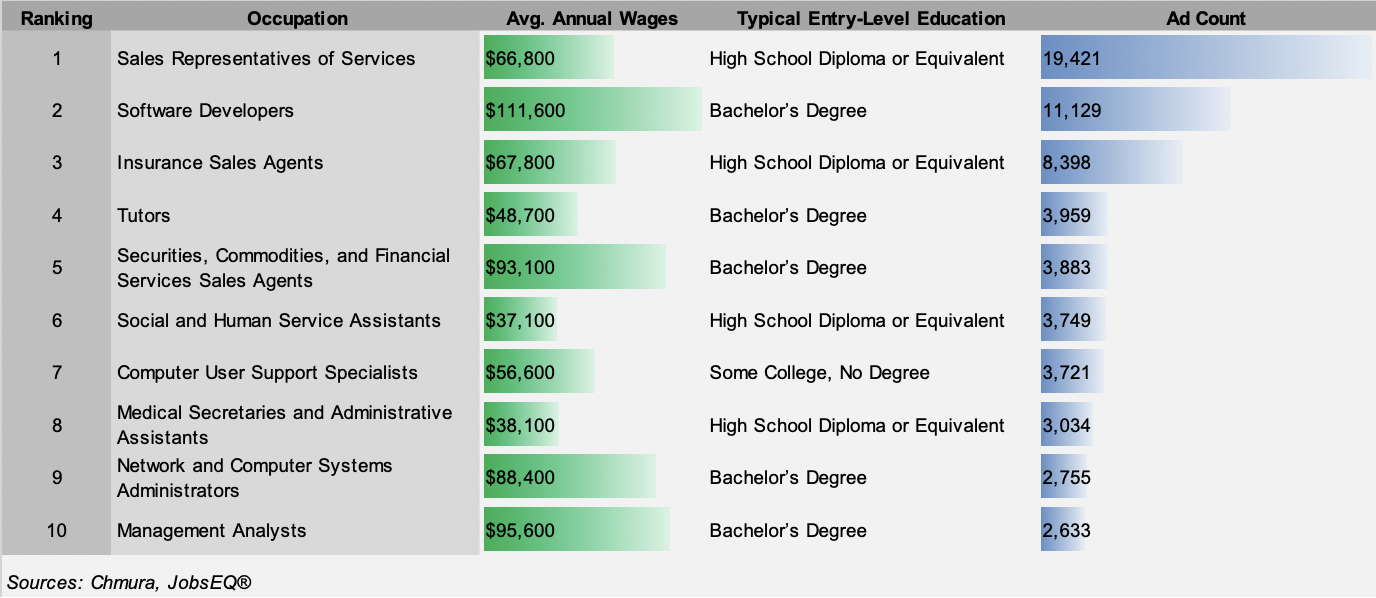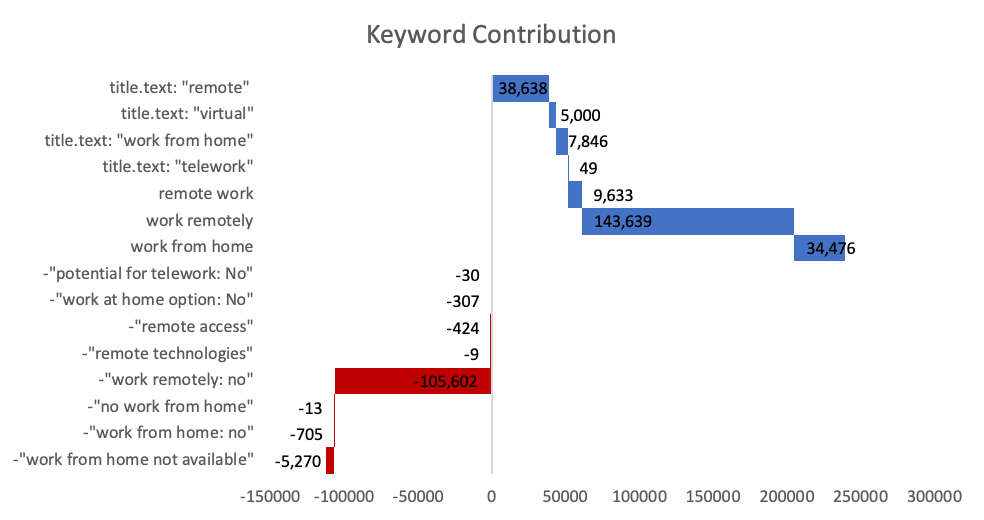Since 2005, regular work-at-home jobs have grown 11% faster than the overall labor market. The COVID-19 pandemic, however, has forced companies worldwide to explore sustainable work from home policies which they likely would not have otherwise. Some large companies have announced that remote work will likely remain a reality into 2021.[1] Moreover, several companies, including Twitter, have publicized plans which would allow many of their employees to work remotely “forever” if they so choose. Shopify, an e-commerce corporation, is aiming to transition to permanent remote work for all their employees.
Past trends, along with current economic developments due to COVID-19, strongly suggest remote work will become increasingly more prevalent, even after a vaccine for COVID-19 is widely circulated. In this period of the highest unemployment rate since the Great Depression, job seekers and workforce practitioners may be interested in finding viable remote job opportunities. This blog summarizes some of the top options and gives suggestions for keyword searches.
Jobs Specifically Advertised for Remote Work
Chmura recently released a baseline analysis on which occupations could be performed remotely in the pre-COVID environment. Information on industries and regions which possess the highest and lowest concentrations of remote occupations were reported. Importantly, certain occupations have varying levels of available remote jobs, even if work could be done remotely. Moreover, with COVID-19 raising the importance of remote work, the baseline has already started to change, and jobseekers may wonder what occupations are most in-demand for remote work right now. Chmura has evaluated various search terms and compiled a list of the top ten most prevalent remote occupations over the past month.
The Top Ten
The following list was composed using the Real-Time Intelligence (RTI) analytic in Chmura’s JobsEQ®. Only occupations which have been determined to have duties which can be performed at least partially from a remote setting were analyzed.[2]
While these data are generalized for the entire United States, RTI subscribers can access current remote job postings data for a particular region by incorporating appropriate keyword filters and Chmura’s new “remote” and “partial remote” classifications for occupations which are now available in JobsEQ®.

Occupation Analysis Summary
The majority of recent remote employment ads are for high-skill positions usually requiring at least a bachelor’s degree and include several computer-related occupations. This is to be expected as typical office and computer jobs are among the most flexible and easily adapted to at-home work. Similarly to the last recession, those who possess solid technological capabilities and at least a bachelor’s degree should be best prepared to weather the current economic downturn. However, entry-level positions in customer service and remote sales also make the top ten. These jobs may serve as an exceptional opportunity for workers laid-off from hard-hit industries such as retail and food/accommodation services.[3]
The nature of work is rapidly changing due to COVID-19, and remote work trends are increasingly important for tracking the impact and identifying opportunities for jobseekers. If you wish to learn more about how well your particular region’s economy may be suited for remote work, please see our new Remote Work Index.
About the Data
All data above are derived from JobsEQ, the Real-Time Intelligence online job ad data set, pulled from over 30,000 websites and updated daily. Historical volume is revised as additional data are made available and processed.

The keyword filter feature of RTI in JobsEQ® allows users to perform highly customized searches. Chmura used a string of several keyword searches to identify advertisements specifically highlighting the remote aspect of the anticipated work. Keyword combinations were evaluated for relative importance and their usefulness in adding actual remote ads and removing ads which are not relevant. The evaluation of the keywords and their contribution to the number of ads displayed is summarized in the chart above.[4] It is clear some keywords such as “work from home” and work remotely” pull in more results than others. Similarly “work from home not available” and “work remotely: no” remove the most ads from being falsely classified as “remote.”
[1] Amazon, Microsoft, and Google are just a few of the companies which are planning for such a scenario.
[2] Definitions of remote and partially remote occupations are detailed in our previous blog: http://chmuraecon.com/blog/2020/june/which-jobs-can-be-done-remotely-a-jobseq-analysis-of-remote-occupations/
[3] Interestingly, one of the top job titles gathered in the RTI query was “contact tracer.” Learn more about what skills it takes to become one here.
[4] Data are for the 30 days ending June 30, 2020. The final keyword search used for this blog was: title.text: "remote" OR title.text: "virtual" OR title.text: "work from home" OR title.text: "telework" OR "remote work" OR "work remotely" OR "work from home" -"potential for telework: No" -"work at home option: No" -"remote access" -"remote technologies" -"work remotely: no" -"no work from home" -"work from home: no" -"work from home not available"
.png)
